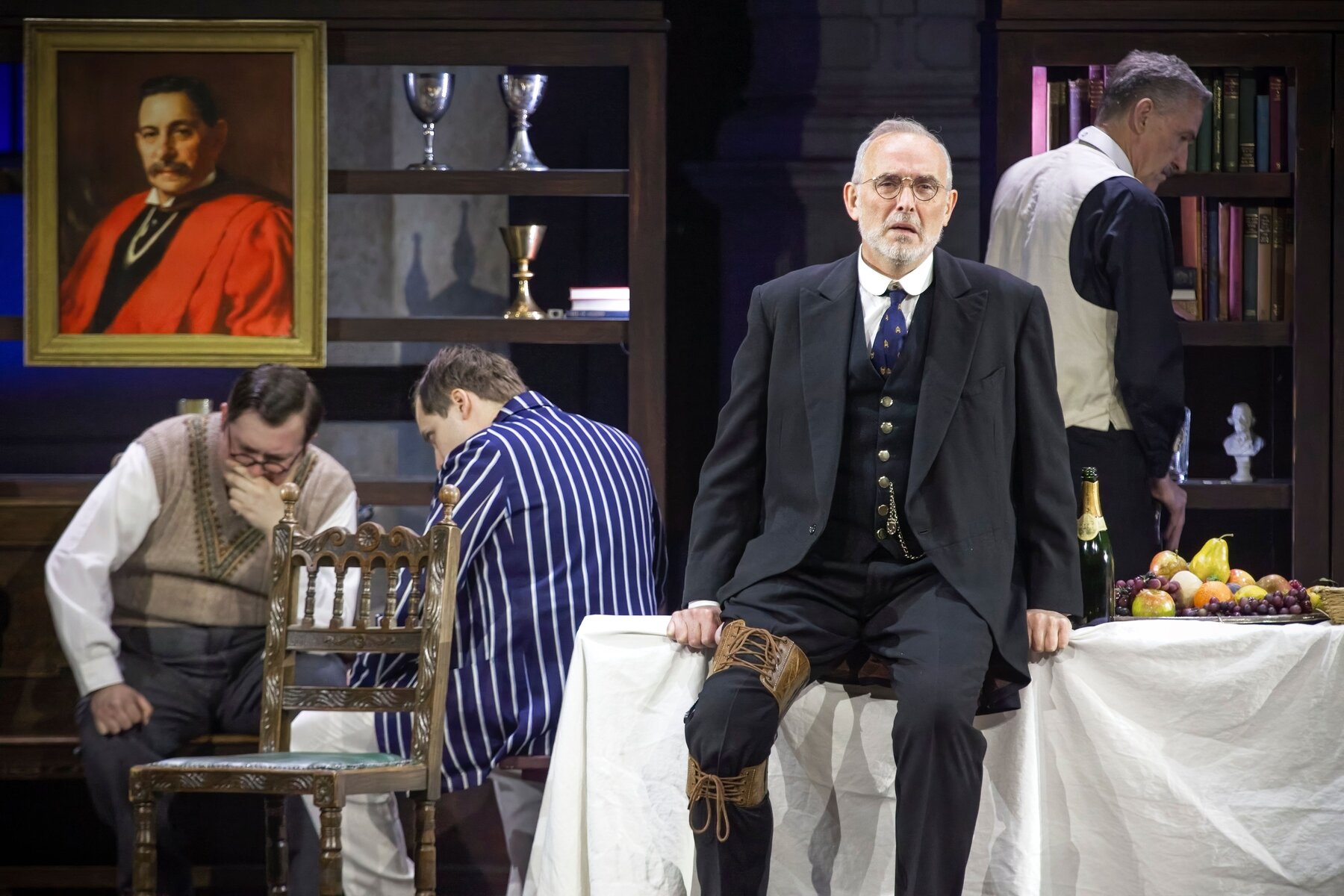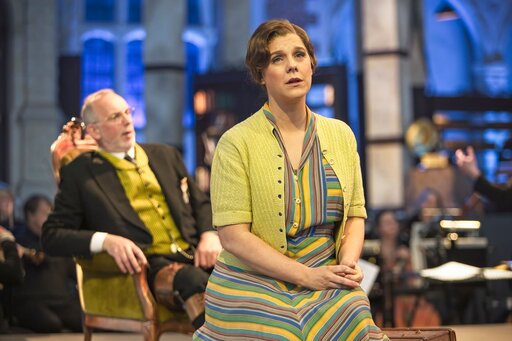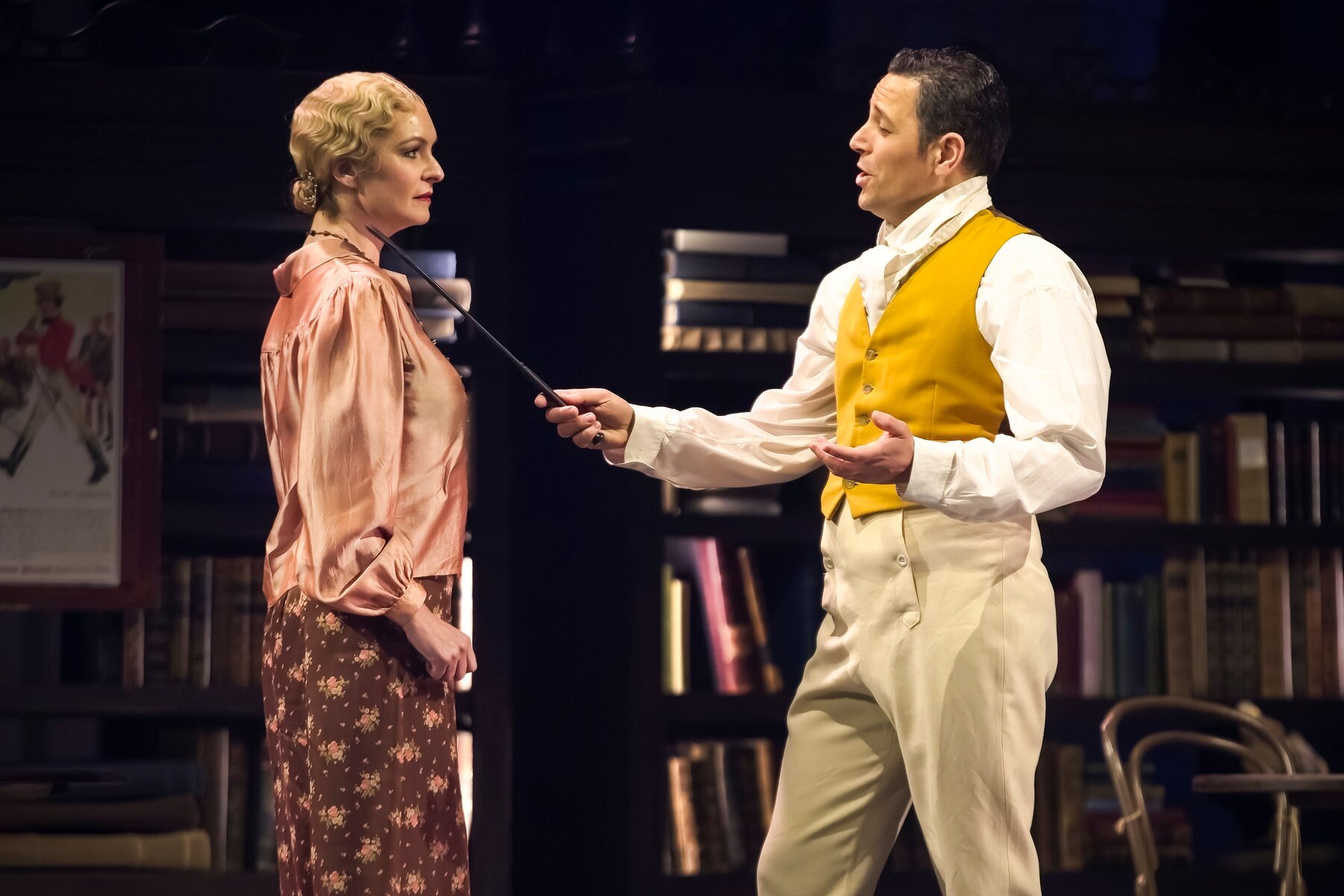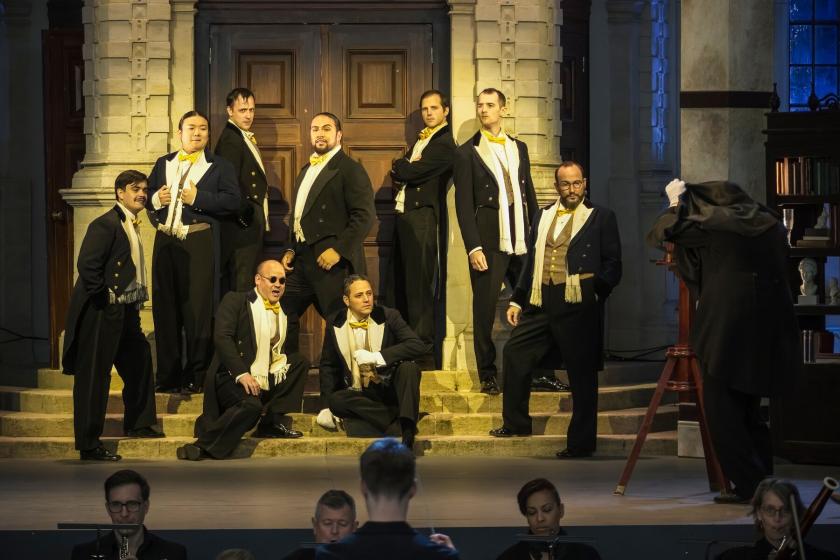“I am a poor student,” the Duke tells a smitten Gilda, in music that can barely keep a straight face, so plush is its melody, so oozing with confidence and privilege.
It’s a short step from there to Cecilia Stinton’s new Rigoletto for Opera Holland Park, which takes him – almost – at his word, transplanting Verdi’s rapey young aristo from 16th-century Mantua to an Oxford college between the wars: a Bullingdon Club hooray to Rigoletto’s downtrodden college porter with a chest full of medals and a gammy leg.
It's a playful idea, Rigoletto as origin-myth for, ahem, a certain type of public political figure, and in Neil Irish’s handsome designs – all heavy bookcases, blades and polished dining tables, set against the sympathetic backdrop of Holland House – it looks great. It also looks like a comedy.
The stakes are so low in this new setting that the ominous curse theme first sounds as a young man is pantsed in a club initiation ceremony – sub-optimal, certainly, but hardly the stuff of tragedy. Matthew Stiff’s Monterone (a bullied Don) must carry off Verdi’s darkest, most tragic music while stumbling about in vest and boxers wrapped up in a coil of bunting. When Act III’s orchestra is giving it the full dark-and-stormy-night for assassin Sparafucile’s seedy inn, we get a cosy village pub complete with hunting get-up for the Duke. Dead bodies disposed of in the Cherwell – it’s more Morse than melodrama. There’s also a problem with Stephen Gadd’s Rigoletto (pictured above). He’s lost in the crowd of a diffuse opening scene (complicated by the decision to pre-record a jazzed up version of the party scene music and deliver it as though via a gramophone), his barbs landing almost unnoticed among all the rough-housing and shenanigans. We lose the balance of the drama: the downfall of this gentle, ineffectual father and his precious daughter is tragic, but it’s not as interesting as when it comes spring-loaded with cruelty: the assassin stabs with a blade; Rigoletto must do the same with his words. This “Pari siamo” never quite convinces us of that.
There’s also a problem with Stephen Gadd’s Rigoletto (pictured above). He’s lost in the crowd of a diffuse opening scene (complicated by the decision to pre-record a jazzed up version of the party scene music and deliver it as though via a gramophone), his barbs landing almost unnoticed among all the rough-housing and shenanigans. We lose the balance of the drama: the downfall of this gentle, ineffectual father and his precious daughter is tragic, but it’s not as interesting as when it comes spring-loaded with cruelty: the assassin stabs with a blade; Rigoletto must do the same with his words. This “Pari siamo” never quite convinces us of that. Seemingly unwell, Gadd fails to stamp much personality on the role musically, running out of every high vocal fence. There’s a nice tenderness to his relationship with Alison Langer’s plucky Gilda (pictured above) – less sheltered than some, a rebel who hides champagne bottles and sunglasses from her father’s watchful eyes, and is ripe for her first romance. It’s the best performance on the stage: sweetly and precisely sung, “Caro nome” gleaming in this difficult space, carefully supported by conductor Lee Reynolds and the City of London Sinfonia on fine form.
Seemingly unwell, Gadd fails to stamp much personality on the role musically, running out of every high vocal fence. There’s a nice tenderness to his relationship with Alison Langer’s plucky Gilda (pictured above) – less sheltered than some, a rebel who hides champagne bottles and sunglasses from her father’s watchful eyes, and is ripe for her first romance. It’s the best performance on the stage: sweetly and precisely sung, “Caro nome” gleaming in this difficult space, carefully supported by conductor Lee Reynolds and the City of London Sinfonia on fine form.
A little rattled on opening night, Alessandro Scotto di Luzio's Duke (pictured below, with Hannah Pedley's Maddalena) came in and out of focus. Pitch and pacing were uncertain, “La donna e mobile” sinking a little with every reprise. At its best it’s a glossy, gorgeous voice, and there’s plenty of swaggering bravado in his manner, but if everything hinges on a sense of inherited, unassailable privilege then it can’t appear to be this much work. There’s efficient support from Simon Wilding’s snarling Sparafucile and Hannah Pedley, giving it the full femme fatale as Maddalena, with a characterful cameo from Georgia Mae Bishop as housekeeper Giovanna. Reynolds is unfailingly musical, and there’s a sense of an organic, fleet account of the score to be revealed once the cast settle into this space and its sometimes scarily wide stage. The Act III quartet, even spread right to its extremes, is already impeccable – hopefully a hint of things to come.
There’s efficient support from Simon Wilding’s snarling Sparafucile and Hannah Pedley, giving it the full femme fatale as Maddalena, with a characterful cameo from Georgia Mae Bishop as housekeeper Giovanna. Reynolds is unfailingly musical, and there’s a sense of an organic, fleet account of the score to be revealed once the cast settle into this space and its sometimes scarily wide stage. The Act III quartet, even spread right to its extremes, is already impeccable – hopefully a hint of things to come.
This feels like a crowd-pleaser, a good-looking, don’t-think-too-closely tragedy that doesn’t let anything inconvenient like murder get in the way of a jolly good evening out. It’s perfectly pitched for the summer opera crowd; I just wish it found a way to smuggle just some of the rage of Laura Wade’s Posh under its academic gowns and generous lapels.















Add comment